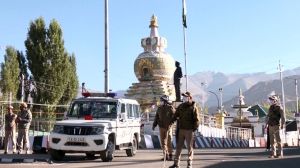Kaunain Sheriff M is an award-winning investigative journalist and the National Health Editor at The Indian Express. He is the author of Johnson & Johnson Files: The Indian Secrets of a Global Giant, an investigation into one of the world’s most powerful pharmaceutical companies. With over a decade of experience, Kaunain brings deep expertise in three areas of investigative journalism: law, health, and data. He currently leads The Indian Express newsroom’s in-depth coverage of health. His work has earned some of the most prestigious honours in journalism, including the Ramnath Goenka Award for Excellence in Journalism, the Society of Publishers in Asia (SOPA) Award, and the Mumbai Press Club’s Red Ink Award. Kaunain has also collaborated on major global investigations. He was part of the Implant Files project with the International Consortium of Investigative Journalists (ICIJ), which exposed malpractices in the medical device industry across the world. He also contributed to an international investigation that uncovered how a Chinese big-data firm was monitoring thousands of prominent Indian individuals and institutions in real time. Over the years, he has reported on several high-profile criminal trials, including the Hashimpura massacre, the 2G spectrum scam, and the coal block allocation case. Within The Indian Express, he has been honoured three times with the Indian Express Excellence Award for his investigations—on the anti-Sikh riots, the Vyapam exam scam, and the abuse of the National Security Act in Uttar Pradesh. ... Read More
Forensic psychology: What is it, what can it reveal on the death of Sunanda Pushkar?
With the probe in the case going nowhere, police say they want to pursue a new line of investigation. The Indian Express explains what it is.
 Sunanda Pushkar was found dead in a five-star hotel suite in New Delhi on January 17, 2014. (File Photo)
Sunanda Pushkar was found dead in a five-star hotel suite in New Delhi on January 17, 2014. (File Photo)
On September 21, Delhi Police told a Delhi High Court Bench of Justices G S Sistani and Chander Shekhar that they would employ a new technique of “forensic psychology” to investigate the death of Sunanda Pushkar, wife of Congress MP Shashi Tharoor. Pushkar, 52, was found dead in a five-star hotel suite in New Delhi on January 17, 2014. Almost a year later, on January 6, 2015, police registered an FIR against unknown persons under IPC Section 302 (murder), but more than two and a half years on, they are yet to file either a chargesheet or a closure report in the case.
So, what is forensic psychology?
As a discipline, forensic psychology sits on the interface of law and psychology. As per the Specialty Guidelines for Forensic Psychology, developed by the American Psychology-Law Society of the American Psychological Association (APA) and American Academy of Forensic Psychology, “forensic psychology refers to professional practice by any psychologist working within any subdiscipline of psychology (e.g., clinical, developmental, social, cognitive) when applying the scientific, technical, or specialised knowledge of psychology to the law to assist in addressing legal, contractual, and administrative matters.”
A psychologist’s professional conduct is considered forensic if she “reasonably expects to, agrees to, or is legally mandated to provide expertise on an explicitly psycholegal issue”. This relatively young branch of applied psychology involves psychological testing and forensic assessment to deduce relevant information on a legal question. This information, which is in form of reports and testimony, is provided to judges, attorneys and law enforcement agencies. In the course of making their assessment, the specialists examine aspects of human behaviour, which are directly related to the legal process — including eyewitness memory, testimony, jury decisionmaking and criminal behaviour.
Why do investigators want to engage a forensic psychologist in this case?
Additional Solicitor General Sanjay Jain, who appeared for Delhi Police, says forensic psychology is used as an investigation tool usually where death is unexplained, and no accused has been named. “It is a case within seven years of marriage. Nobody connected to the family of the deceased has raised any doubt or made any allegation. It is peculiar case because nobody is an accused,” Jain told The Indian Express.
“After forensic experts gave an inconclusive report, ordinarily no FIR would have been registered. But in this case, since an FIR has been lodged, the probe agency has to investigate. Over 90 persons have been questioned, and the help of forensic experts has been sought on seven occasions. Nobody has given a conclusive opinion so far,” Jain said.
Vital parts of the body, which should have been preserved for further investigation, were not preserved, Jain said. “Electronic evidence, including conversations, was tampered with — they were returned to the son of the deceased. We now need to close the investigation. Increasingly, psychological autopsy or analysis is being used all over the world, especially where there is an unexplained death. We are using the tool (of forensic psychology) just to rule out induced death,” Jain said.
And how will the forensic psychologist progress with her assessment?
Sources said some 5-6 persons who were “close” to Pushkar will be put through “psychological autopsy” — a tool to examine their state of mind — in order to reconstruct events leading up to the death. A series of questions will be asked in an interview format, and collateral information will be gathered from people who knew the deceased. An attempt will be made to gather information on the cognitive functioning, psychological well being, state of physical health, spiritual beliefs and social connectedness of the deceased.
Has forensic psychology been used in India earlier?
On three occasions, the High Court was told. The CBI had engaged a forensic psychologist in the 2008 Aarushi Talwar murder case, who had concluded that the parents — now convicted of murder — were “innocent”. The specialist had used polygraph examination, narcoanalysis and brain signature profiling during the assessment. Forensic psychologists were engaged in the investigations of the 2006 Nithari killings and the 2003 Madhumita Shukla murder as well. The Pushkar case is different from the Aarushi case because there were clear accused and evidence in the latter case; here, as Jain says, “because nobody is an accused”, the examination will be different.
Who will conduct the examination? Will the findings be admissible as evidence in court?
The Central Forensic Science Laboratory (CFSL), CBI, in New Delhi, which is a scientific department under the administrative control of CBI, has a forensic psychology division, which extends its services to Delhi Police and other law enforcement agencies. The division conducts “detection of deception” through methods like polygraph and forensic psychological assessment ; it also conducts research in this field.
In the Aarushi case, since the expert’s opinion was different from that of the investigating agency, it was not produced before the court as evidence. Experts at AIIMS say findings of forensic psychology can only help investigators; they cannot be used as evidence. Just as the lie detection test is not admissible, these tests too can’t be used as evidence under the Evidence Act,” said an expert who has conducted the forensic examination in the Sunanda Pushkar case.
Is forensic psychology used internationally as an investigation tool?
Harvard psychologist Hugo Münsterberg is credited with founding the field of forensic psychology. His landmark work, On the Witness Stand: Essays on Psychology and Crime (1908), argued for involving psychologists in various aspects of the legal system. However, it was only in 2000 that a petition was submitted to the APA seeking recognition of forensic psychology as a specialty; the APA Council of Representatives approved it the following year.
Psychological autopsy had been used by investigators in the 1999 Columbine High School massacre of 12 students and a teacher, and in the Virginia Tech shooting of 2007, in which a student killed 32 before committing suicide. In a less high-profile case, investigators conducted a psychological autopsy and interviewed 69 people to better understand the 2011 murder of a woman and her two children by her estranged husband who had then proceeded to kill himself.



- 01
- 02
- 03
- 04
- 05




































